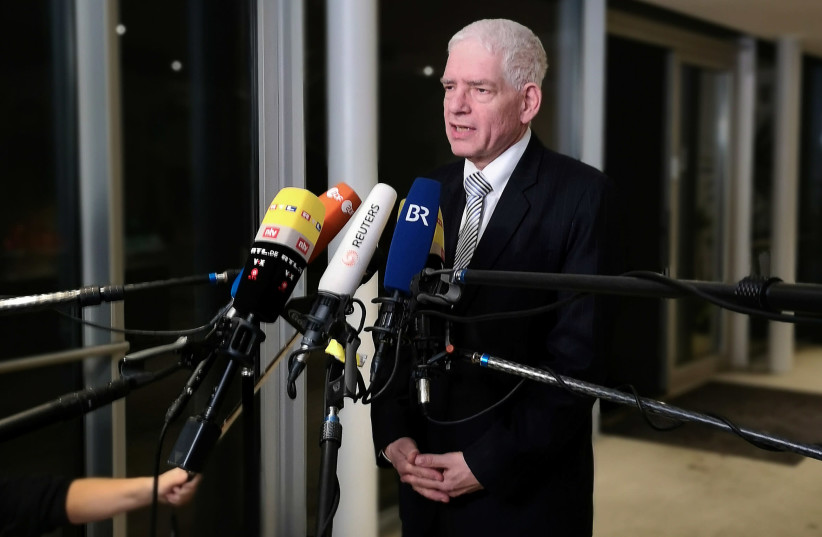“I cannot understand the German voting behavior at the UN in any way. It would be good if an optician could readjust German foreign policy in dealing with Iran”
BENJAMIN WEINTHAL
OCTOBER 20, 2020 02:38

The president of Germany’s roughly 100,000 member Jewish community urged Chancellor Angela Merkel’s foreign ministry to show more toughness against the Islamic Republic of Iran and reverse her top diplomat’s anti-Israel voting record at the UN.
Josef Schuster, the German Jewish community president, on Friday told the Neue Zürcher Zeitung (NZZ), a Swiss German-language daily newspaper, that “I really expect more bite from German foreign policy” in connection with Merkel’s approach toward the Iranian regime.
He told the NZZ reporter, Alexander Kissler, that the Hamburg city-state government should pull the plug on its cooperation agreement with the Iranian regime-controlled Islamic Center Hamburg.
Kissler asked Schuster about the pro-Israel group German-Israel Friendship Society in Hamburg urging a Hamburg district not to re-nominate the MP Niels Annen because he serves as a “door opener for the Iranian Mullahs.”
Annen is also a social democratic deputy foreign minister who has shown sympathy for the Boycott, Divestment, Sanctions campaign targeting Israel. The Bundestag classified BDS as an antisemitic movement last year.
The NZZ journalist questioned Schuster about Germany’s “frequent joint voting with states hostile to Israel” at the UN.
“I cannot understand the German voting behavior at the UN in any way. It would be good if an optician could readjust German foreign policy in dealing with Iran,” said Schuster.
When asked about the BDS campaign, Schuster said “In general, if I may be ironic, it is much more elegant for antisemites not to speak of ‘the Jews’ but of Israel. Of course, the policy of the Israeli government can and may be criticized as well as the policy of the German government.”
He continued that ”But if Israel’s right to exist is called into question or if Israel is measured by different standards than all other countries, then it is no longer a legitimate criticism. Some even allow themselves to be carried away to the unspeakable comparison that Israel deals with the Palestinians today as the National Socialists did with the Jews in the past. That is completely absurd.”
Schuster said there is “left-wing antisemitism.”
Schuster declined to answer a Post press query about three German left-wing MPs on the advisory board of a BDS group that calls for the elimination of Israel.
The president of German’s Central Council of Jews has faced criticism over the last few months for turning inward toward political BDS and avoiding criticism of Merkel’s reportedly anti-Israel and pro-Iranian regime policies.
Daniel Killy, a German Jewish journalist and activist, told the Post, that “I very much regret that the Central Council is unable to take a position against the BDS ideology of the three MPs. In addition to the free courage to take a stand against classic antisemitism from the far right, it would be high time to finally recognize that the so-called Palestine solidarity and alleged anti-Zionism are at least equally poisoned forms of antisemitism.”
He added that”In any case, social blinders and ostentatious silence do not help the Central Council any further! We should also be able to expect leadership against any form of antisemitism from the leadership of German Jewry.” Schuster did not respond to a Post query about Killy’s comment.
The Post exclusively reported in August that Schuster ignored a proposed briefing from a top US government official about the dangers of the Iranian regime and American efforts to impose snapback sanctions on Tehran to stop the Islamic Republic from purchasing conventional weapons and building a nuclear military device. Merkel’s government did not oppose extending the UN weapons embargo against Tehran.
Rabbi Abraham Cooper, the associate dean of the Simon Wiesenthal Center, told the Post at the time that the briefing from the US official “is exactly the kind of information that key European Jewish leaders would want to have in hand on an issue that will impact Jews in Europe and elsewhere in the future. It was disappointing.”
Henryk Broder, the best-selling German-Jewish author, who is Germany’s leading expert on antisemitism, asked Schuster if he plans to critically respond to the German historian Wolfgang Benz, who denied that BDS is hostile to Jews and antisemitic.
Benz, a historian of antisemitism, who honored his Nazi doctoral supervisor Karl Bosl, said “The BDS movement is not in itself antisemitic. It recommends a political means to achieve a political purpose. It goes against the policy of the State of Israel. It’s not about Jews.”
Schuster declined to respond to Broder’s query.
Content retrieved from: https://www.jpost.com/arab-israeli-conflict/german-jewish-president-wants-assertive-policy-against-irans-regime-646274?fbclid=IwAR3MKM8U7brbP7gLAcSWytZlmDupr54vuJNWQbnzDRyrSuEdOuio2XQsbk4.